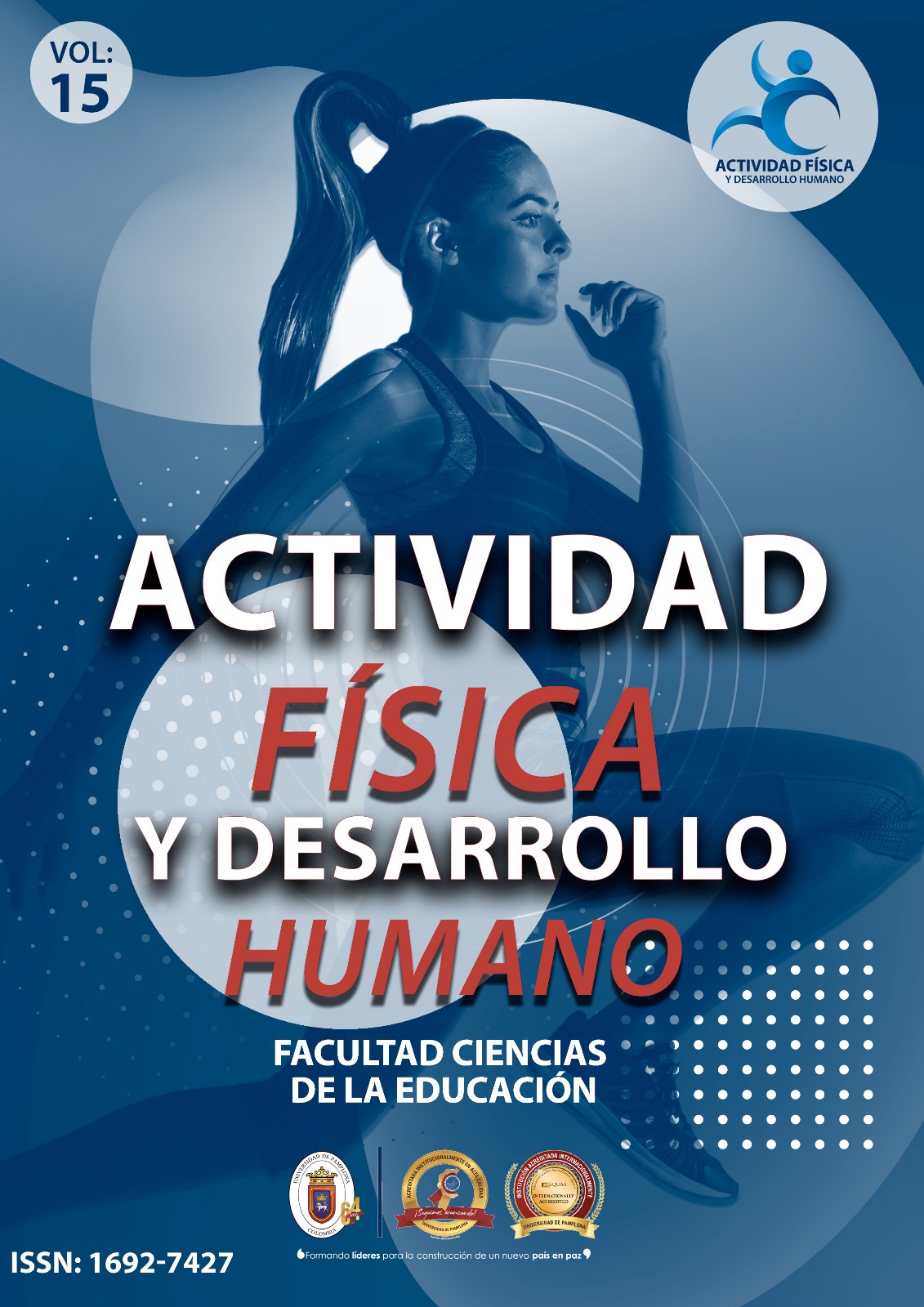Impacto del deterioro cognitivo, inadecuada alimentación e inactividad física en la vejez
DOI:
https://doi.org/10.24054/afdh.v15i1.3132Palabras clave:
Inactividad física, mala alimentación, hábitos saludablesResumen
El objetivo principal de esta documento es dar a conocer los factores que desencadenan las enfermedades no transmisibles en personas mayores, ya que la tasa de mortalidad va en aumento por este tipo de patologías que no se previenen a tiempo; una de ellas es la mala alimentación, que provoca diferentes efectos negativos en este ciclo vital, como lo es la obesidad, el colesterol alto, el nivel bajo de proteínas, deterioro cognitivo, entre otras; siendo estas adquiridas en la vejez, al no llevar un estilo y hábito de vida saludable. Asimismo, se dará a conocer el deterioro cognitivo y la soledad en adultos mayores, con base a diversas investigaciones relacionadas con la misma, así como las posibles intervenciones para mejorar su salud cognitiva, emocional, promover la actividad física, la atención plena, una dieta saludable, la importancia de abordar la soledad, más aún si la interacción social actúa como mecanismo para dar solución a los bajos estados anímicos; puesto que de acuerdo a estudios realizados, la soledad se clasifica como un estado muy común en personas mayores que residen en países de ingresos bajos a medios, la actividad física se presenta como otra estrategia potencial para reducir la soledad en este grupo etario, aunque la relación varía entre países. Por último, se resalta las secuelas que trae consigo la inactividad física a causa del sedentarismo, cambios fisiológicos como funcionales, presentes en la persona mayor e incluso la estrecha relación que se tiene con la edad.
Descargas
Referencias
Assuncao, N., Sudo, F. K., Drummond, C., de Felice, F. G., & Mattos, P. (2018). Metabolic Syndrome and cognitive decline in the elderly: A systematic review. PloS one, 13(3), e0194990. https://doi.org/10.1371/journal.pone.0194990
Blind, Placebo-Controlled, Multicenter Trial. The journals of gerontology. Series A, Biological sciences and medical sciences, 76(1), 32–40.
Ciumarnean, L., Milaciu, M. V., Negrean, V., Orasan, O. H., Vesa, S. C., Salagean, O., Ilut, S., & Vlaicu, S. I. (2021). Cardiovascular Risk Factors and Physical Activity for the Prevention of Cardiovascular Diseases in the Elderly. International journal of environmental research and public health, 19(1), 207. https://doi.org/10.3390/ijerph19010207
Greenwood, C. E., Tam, C.,Chan, M, Young, K.W. H., Binns, M. A., &Van Reekum, R. (2005). Behavioral disturbances, not cognitive Sciebces, 60(4), 499-505.
Hooper, S. C., Kilpela, L. S., Gomez, F., Middlemass, K. M., & Becker, C. B. (2023). Eating disorder pathology in a sample of midlife and older adults experiencing food insecurity. Eating behaviors, 49, 101742. https://doi.org/10.1016/j.eatbeh.2023.101742
Jyyakorpi et al., (2016). High proportions of older people with normal nutritional status have poor protein intake and low diet quality. Archives of gerontology and geriatrics, 67, 40-45 https://doi.org/10.1016/j.archger.2016.06.012
Kim, C. S., Cha, L., Sim, M., Jung, S., Chun, W. Y., Baik, H. W., & Shin, D. M. (2021). Probiotic Supplementation Improves Cognitive Function and Mood with Changes in Gut Microbiota in Community-Dwelling Older Adults: A Randomized, Double-Blind, Placebo-Controlled, Multicenter Trial. The journals of gerontology. Series A, Biological sciences and medical sciences, 76(1), 32–40. https://doi.org/10.1093/gerona/glaa090
Lenze, E. J., Voegtle, M., Miller, J. P., Ances, B. M., Balota, D. A., Barch, D., Depp, C. A., Diniz, B. S., Eyler, L. T., Foster, E. R., Gettinger, T. R., Head, D., Hershey, T., Klein, S., Nichols, J. F., Nicol, G. E., Nishino, T., Patterson, B. W., Rodebaugh, T. L., Schweiger, J., … Wetherell, J. L. (2022). Effects of Mindfulness Training and Exercise on Cognitive Function in Older Adults: A Randomized Clinical Trial. JAMA, 328(22), 2218–2229.
Morley J. E. (2018). An Overview of Cognitive Impairment. Clinics in geriatric medicine, 34(4), 505–513.
Mamani Contreras, R. M., Roque Guerra, E., Colque Machacca, N. M., & Solorzano Aparicio, M. L. (2023). Actividad física y el deterioro cognitivo en adultos mayores. Ciencias de la actividad física, 24(1), 1–14. https://doi.org/10.29035/rcaf.24.1.8
Melo, E. A. S. de, Ferreira, L. E. de S., Cavalcanti, R. J. F., Botelho Filho, C. A. de L., Lopes, M. R., & Barbosa, R. H. de A. (2021). Nuances between sedentary behavior and physical inactivity: cardiometabolic effects and cardiovascular risk. Revista da Associacao Medica Brasileira (1992), 67(2), 335–343. https://doi.org/10.1590/1806-9282.67.02.20200746
Nogueira, G., Fidelix, Y. L., Nascimento Junior, J. R. A. do, & Oliveira, D. V. de. (2023). Physical activity and sedentary behavior as predictors of fear of falling and risk of sarcopenia in older adults. Fisioterapia em Movimento, 36. https://doi.org/10.1590/fm.2023.36118
Nuzum, H., Stickel, A., Corona, M., Zeller, M., Melrose, R. J., & Wilkins, S. S. (2020). Potential Benefits of Physical Activity in MCI and Dementia. Behavioural neurology, 2020, 7807856
Ramsey, K. A., Rojer, A. G. M., D'Andrea, L., Otten, R. H. J., Heymans, M. W., Trappenburg, M. C., Verlaan, S., Whittaker, A. C., Meskers, C. G. M., & Maier, A. B. (2021). The association of objectively measured physical activity and sedentary behavior with skeletal muscle strength and muscle power in older adults: A systematic review and meta-analysis. Ageing research reviews, 67, 101266. https://doi.org/10.1016/j.arr.2021.101266
Santos, L. dos, Silva, R. R., Santana, P. dos S., Valença Neto, P. da F., Almeida, C. B. de, & Casotti, C. A. (2022). Fatores associados à dinapenia em idosos do nordeste brasileiro. Journal of Physical Education, 33(1). https://doi.org/10.4025/jphyseduc.v33i1.3342
Sasaki, K. I., & Fukumoto, Y. (2022). Sarcopenia as a comorbidity of cardiovascular disease. Journal of cardiology, 79(5), 596–604. https://doi.org/10.1016/j.jjcc.2021.10.013
Vancampfort, D., Lara, E., Smith, L., Rosenbaum, S., Firth, J., Stubbs, B., Hallgren, M., & Koyanagi, A. (2019). Physical activity and loneliness among adults aged 50 years or older in six low- and middle-income countries. International journal of geriatric psychiatry, 34(12), 1855–1864.
Walker-Clarke, A., Walasek, L., & Meyer, C. (2022). Psychosocial factors influencing the eating behaviours of older adults: A systematic review. Ageing research reviews, 77, 101597. https://doi.org/10.1016/j.arr.2022.101597
Yeung, S. S. Y., Kwan, M., & Woo, J. (2021). Healthy Diet for Healthy Aging. Nutrients, 13(12), 4310. https://doi.org/10.3390/nu13124310
Descargas
Publicado
Número
Sección
Licencia
Derechos de autor 2024 Daniela Marroquín Carrillo, Paula Daniela Acosta Barajas, Ginna Paola Pachón Hernández

Esta obra está bajo una licencia internacional Creative Commons Atribución-NoComercial-SinDerivadas 4.0.











